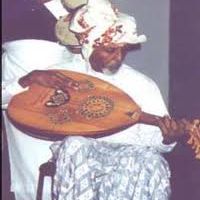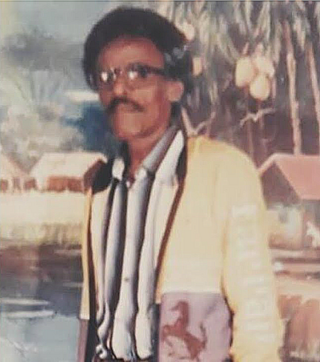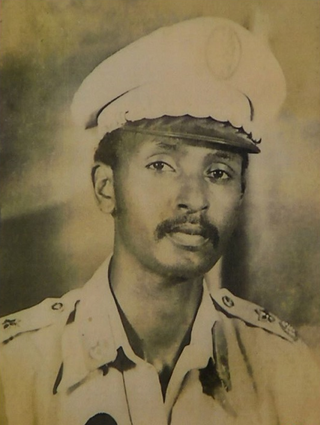Related Research Articles

The Music of the Somali people is music following the musical styles, techniques and sounds of the Somali people.

The Isaaq is a major Somali clan. It is one of the largest Somali clan families in the Horn of Africa, with a large and densely populated traditional territory.

The Dir is one of the largest and most prominent Somali clans in the Horn of Africa. They are also considered to be the oldest Somali stock to have inhabited the region. Its members inhabit Djibouti, Somalia, Ethiopia, and northeastern Kenya.
The Somali Rebellion was the start of the Somali Civil War that began in the 1970s and resulted in the collapse of the Somali Democratic Republic in 1991. The rebellion effectively began in 1978 following a failed coup d’état and President Siad Barre began using his special forces, the "Red Berets", to attack clan-based dissident groups opposed to his regime. Backed by Ethiopia, the two earliest rebel factions, the Somali Salvation Democratic Front (SSDF) and the Somali National Movement (SNM) began attacks during the against government forces during the early 1980s.
Over the course of the Somali Civil War, there have been many revolutionary movements and militia groups run by competing rebel leaders which have held de facto control over vast areas within Somalia.

The Awal, also contemporarily known as the Habr Awal, Subeer Awal, and alternately known as the Zubeyr Awal is one of the largest subclans of the wider Isaaq clan family, and is further divided into eight sub-clans of whom the two largest and most prominent are the Isamusa and Sa'ad Musa sub-clans. Its members form a part of the Habar Magadle confederation.
Adan Ahmed Elmi was the 4th Agricultural Minister of Somaliland. He became the Agricultural Minister on May 10, 2002, after the resignation of Ali Sheik Yusuf.

Ali Matan Hashi, also known as Ali Matan, was a Somali senior military official and politician. He was the first Somali pilot, and a prominent member of the Supreme Revolutionary Council (SRC).
Abdi Sinimo was a Somali singer, songwriter, poet and musical innovator. He is noted for having established the Balwo genre of Somali music, which was the forerunner of the Heelo genre and thus gave birth to modern Somali music.

Abdullahi Qarshe (1924–1994) was a Somali musician, poet and playwright known as the "Father of Somali music". In 1957 he wrote and composed the Somali National Anthem, Qolobaa Calankeed.
The National Theatre of Somalia is located in central Mogadishu, Somalia. It opened in 1967, and served as an important cultural landmark in the national capital. The institution closed down after the start of the civil war in the early 1990s, but was later intermittently renovated by the local authorities. In 2013, the Somali and Chinese governments signed an official cooperation agreement as part of a five-year national recovery plan in Somalia that will see the Chinese authorities reconstruct several major infrastructural landmarks in Mogadishu and elsewhere, including the National Theatre.

Musa Bihi Abdi is a Somali politician and former military officer who has been President of Somaliland since December 2017.

Mohamed Sulayman Tubeec, was a Somali singer, songwriter and record producer. he gained the nickname of " King of Voice."

The Isamusa (Somali: Ciisemuuse, Arabic: عيسى موسى, is a prominent Somali clan which is part of the Isaaq family clan. The Isamusa traditionally consists of coastal people, nomadic pastoralist and merchants. This clan are primarily settled in Somaliland, including Maroodi Jeex, Togdheer, Sahil, Awdal, Djibouti, Yemen, as well as Kenya. Isamusa populations are present in southern Somalia such as Mogadishu.

Radio Hargeisa is a Somaliland public service broadcaster, Its headquarters are at Ministry of Information, Hargeisa.
Seynab Haji Ali Siigaale was a Somali singer, songwriter and stage actress. Along with Magool and Guduudo Carwo, Baxsan was one of the most popular performers of the 20th century.
The Sa'ad Musa or Saad Musa is a northern Somali clan. Its members form a part of the Subeer Awal sub-clan of the Isaaq clan family. The Sa'ad Musa traditionally consists of nomadic pastoralists, coastal people, merchants and farmers. The clan inhabits Somaliland, including Maroodi Jeex,Awdal and Sahil as well as Djibouti, the Somali Region of Ethiopia, Kenya and Tanzania.

The Somaliland War of Independence was a rebellion waged by the Somali National Movement (SNM) against the ruling military junta in Somalia led by General Siad Barre lasting from its founding on 6 April 1981 and ended on 18 May 1991 when the SNM declared what was then northern Somalia independent as the Republic of Somaliland. The conflict served as the main theater of the larger Somali Rebellion that started in 1978. The conflict was in response to the harsh policies enacted by the Barre regime against the main clan family in Somaliland, the Isaaq, including a declaration of economic warfare on the clan-family. These harsh policies were put into effect shortly after the conclusion of the disastrous Ogaden War in 1978.

Hassan Yonis Habane was a chief of staff of the Somaliland Armed Forces. As one of the commanders of the SNM, the predecessor of Somaliland, he won many battles and was one of the initiators of Somaliland's independence.
References
- Fanka Ka Bixi-Maayo, Waxaanu Ku Abuuran Yahay Dhiigayga, Waanan La God-Gelayaa
- Interview with the late Abdullahi Qarshe (1994) at the Residence of Obliqe Carton in Djibouti
- "Magool: The Inimitable Nightingale of Somali Music," Bildhaan: An International Journal of Somali Studies: Vol. 14, Article 5.